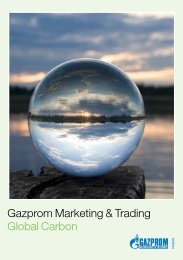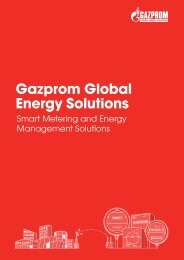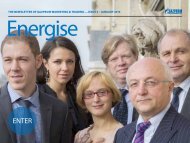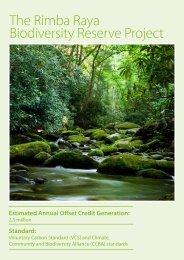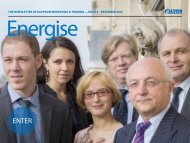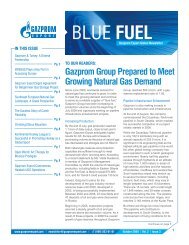October
October
October
Create successful ePaper yourself
Turn your PDF publications into a flip-book with our unique Google optimized e-Paper software.
<strong>October</strong> 2012 | Vol. 5 | Issue 3BLUE FUELnatural gas is the most environmentally friendly of all motorfuels available for commercial sale; methane enables a 50%reduction in CO 2emissions and 80% in NOx.Price – the average retail price of compressed natural gas isequal to half the price of petroleum products; natural gas is thecheapest of all motor fuels available for commercial sale.Readiness – the degree and stage of productization; naturalgas is available for commercial sale in more than 80 countriesaround the world.Infrastructure – the level of development of filling stations:methane is available at nearly 21,000 filling stations.Sustainability – the possibility of obtaining this type of fuelfrom other sources or synthetically at affordable prices:methane can be regarded as a renewable energy source sinceit can be produced from biomass or synthetically.Independence – the ability to introduce the fuel into themarket without government support; such support for naturalgas is desirable but not a must, as is the case with other –political – alternatives.The following table reflects a peer assessment of thecommercial attractiveness of each alternative fuel for use in theglobal transportation segment.The conclusion can be presented as follows: At present andin the future, the most optimal kind of motor fuel, from allpoints of view, is methane, the main source of which is andwill remain natural gas.Methane has the unique feature of combining allenvironmental, technical and commercial advantagessimultaneously. No other fuel offers such a combination.It can be argued that the golden age of methane intransport isinevitable. In 2011, world consumption of natural gas by vehicleswas estimated at 35 to 40 billion cubic meters. According tovarious forecasts, by 2035 the global fleet of gas-cylinder carswill range from 30 to 190 million units – from 2% to 10% ofthe world’s total vehicle fleet – with natural gas consumptionbetween 60 and 380 billion cubic meters per year.This in turn allows for adding another criterion to thosepreviously mentioned: investment attractiveness. In thecoming years, it is likely that the market for methane intransport may grow 10 times (!). This is a very significantvolume, considering this fuel’s consumption by water and railtransport. Simple arithmetic shows that, at May 2012 prices,the world gas engine market may reach up to 400 billioneuros on the gas component alone.The time is ripe for investment in the market for gas motor fuels.Gazprom and Summa Group to Develop Global LNG Marketfor Marine Fleet Bunker FuelIn September 2012, Deputy Head of the GazpromManagement Committee Alexander Medvedev and Presidentof Summa Group Alexander Vinokurov signed a Memorandumof Understanding stipulating cooperation in the use of liquefiednatural gas (LNG) as a bunker fuel for marine fleets, includingthose belonging to and operated by Summa Group.Initially, Gazprom and Summa Group will study opportunitiesfor cooperation in the region of the North and Baltic seas.Aside from supplying LNG for the needs of Summa Group, theparties will also consider the possibility of developing bunkeringinfrastructure in the basin of the Baltic and North seas,including LNG storage facilities.Further, the parties will consider the possibility of expandingcooperation into the Black Sea, Mediterranean and Pacific,regions where Summa Group also operates its fleet andpossesses well-developed harbor infrastructure.“The strict mandatory emission limitations that will be imposedafter 2015 for the vessels operating in the Baltic and NorthSeas are a crucial factor in switching to alternative fuel. Onlynatural gas fully complies with the emission limits for marinemotors without need for expensive filters and has priceadvantages over low-sulfur petrochemicals. The vessel, motorand storing technologies for the LNG-fueled fleet are availableand proven. Cooperation with the Summa Group has a strongpotential,” Alexander Medvedev noted.“Due to the joint efforts of Summa Group as an infrastructureoperator and Gazprom as the world’s biggest natural gasproducer, a real breakthrough will be achieved. I am sure itwill provide a long-term positive impact on the environmentaleffects of marine transport, not only in our country but alsoglobally, and will provide a new standard for the wholeindustry,” Alexander Vinokurov said.Summa Group is a Russian-based diversified private holdingjoining assets in port logistics, engineering, construction,telecommunications and the oil and gas sectors. SummaGroup is active in almost 40 regions of Russia and abroad.www.gazpromexport.com | newsletter@gazpromexport.com | +7 (499) 503-61-61 | comm@gazpromexport.com 13ÝÊÑÏÎÐÒ



